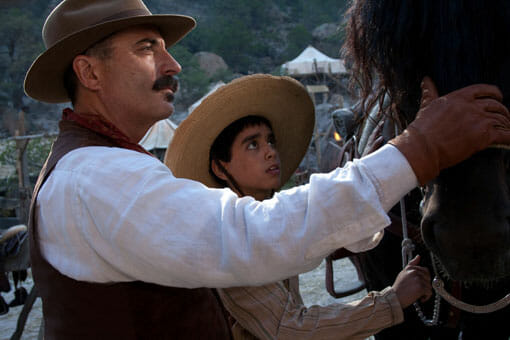By Sunny Choi · June 3, 2012

For Greater Glorypowerfully encourages individuals to stand up for their beliefs. At first, I thought it was going to be one of those preachy war movies. I was slightly put off by the over-the-top orchestral music surging in the background and some of the stilted, grandiose monologues. However, the movie became rather compelling as it unfolded the spiritual developments of General Enrique Gorostieta Velarde (Andy Garcia) and José Luis Sanchez (Mauricio Kuri).
In Mexico, 1926, President Plutarco Elias Calles (Rubén Blades) closes down the Mexican Catholic Church and starts to persecute Catholics, especially priests. At first, the National League for Religious Liberty peacefully protests through petitions and economic boycotts. The government retaliates by massacring innocent Catholics. By this time, several resistance armies, consisting of clergy, youth, farmers, and artisans, have started to fight back. The League begins supporting the Cristeros (“soldiers for Christ”) with food, finances, ammunition, and medical care. They decide to hire a central commander and military strategist to organize this fragmented movement.
They appoint retired General Gorostieta, an affluent owner of a factory and the newspaper, for the position. The war hardly affects him, except when his daughters are forced to discontinue their catechism, to the dismay of his wife (Eva Longoria). Despite his success as a post-war tycoon, Gorostieta feels restless and fears being stuck living in the past. Although he is an atheist and has problems with the Church, he accepts the position because he believes in the right to religious freedom.
Gorostieta works closely with a roguish rancher, Victoriano Ramirez (Oscar Isaac) and a militant priest, Father Vega (Santiago Cabrera). As an astute military strategist, Gorostieta secures many significant victories for the Cristeros. However, the movie does not end there. The film also follows the story of young Jose, a twelve-year-old boy who decides to join the Cristeros after witnessing the cruelties of the government soldiers. As Gorostieta forges a close bond with Jose, he realizes the importance of standing up for what he believes in. Inspired by Jose’s steadfastness and bravery, Gorostieta recovers his faith in religious freedom and even in God.
**Spoiler Alert!**
If the first thirty minutes of the movie consists of exposition and political drama, the second part of the movie features a lot of action. And the final part of the movie shifts to sentimentality. Now, perhaps it’s because I’m sappy, but I found the last thirty minutes of the movie to be the most moving and heart wrenching. I half-expected the movie to be about Andy Garcia leading the team to victory, but that’s not really the main point of the movie. Jose steals the movie as he withstands torture and violence to declare his allegiance to the Cristeros. The movie commemorates these brave men not only as heroes but also as martyrs.
I appreciated how the film covered the Cristeros War from multiple points of view, including the female League activists who smuggled ammunition across the country beneath their undergarments. The film also shows how the Cristeros War gained recognition in the international arena. While the U.S. ambassador to Mexico (Bruce Greenwood) first approaches Calles to secure a solid supply of petroleum, he realizes the alarming gravity of the Civil War and urges Calles to secure a compromise with his people. The film illustrates how foreign intervention complements the Mexican struggle for human rights and religious freedom, both of which are not as well known about in the U.S.
Some of the dialogue could have been more nuanced. Calles’ monologue about the discontent public rendered him a sort of caricature for the evil dictator. He says, “You cannot be soft with these people. I showed restraint, and they became more insolent and rebellious. They want to wreck Mexico and bring the government down.” When the Federales (government forces) are about to execute Father Christopher, one of them declares, “and let this be a lesson to all of you.” While I understand this is a Hollywood movie, this simplified, black-and-white representation of the “evil villains” slightly discredits the movie’s claim to historical realism.
I also think the movie could have used more editing. They should not have taken that long to introduce Gorostieta as a potential candidate for the job. Instead of featuring Calles’ multiple flat monologues, I think the film could have further examined the teacher-pupil relationship between Gorostieta and Jose and their respective transformations into servants of God. While these developments were meaningful and very moving, they could have felt less forced with a little more depiction.
Despite the flaws mentioned above, the solid acting and commendable message allows the film to shine. This film would be a good choice for those who enjoyed historical dramas like Braveheart and Glory in which oppressed people fight for their beliefs. There are many battle sequences, but all these scenes of violence reflect profound purpose and meaning.